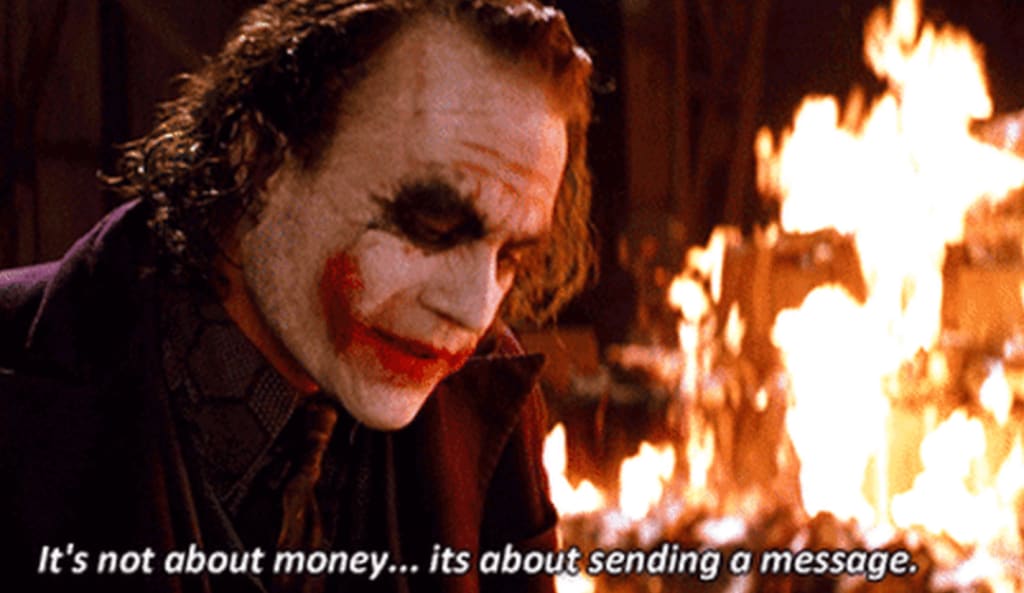
Introduction
Picture this: you're walking down a bustling street in a wealthy city, surrounded by towering skyscrapers, designer boutiques, and fancy restaurants. As you marvel at the opulence around you, you can't help but wonder - are the people living in these luxurious apartments truly rich? Is their wealth solely measured by their bank account balances or the assets they own? What about the poor people living on the streets, struggling to make ends meet - are they truly poor because they lack material possessions? These are the questions that lead us to today's topic - "The opposite of riches is not poverty; the opposite of riches is justice." It's a quote that challenges our conventional understanding of wealth and prompts us to reflect on the role of justice in creating a fair and prosperous society. So, buckle up and get ready to explore the intricacies of wealth and justice with me, in my signature style.
Understanding Riches
Before we dive into the concept of justice, let's take a moment to unpack what we mean by "riches." Most of us have a general sense of what it means to be rich - having a lot of money or owning valuable assets. But as with many things in life, the definition of riches is not so straightforward.
Firstly, riches come in different forms. Some people may be monetarily wealthy, while others may possess other forms of wealth such as knowledge, social connections, or emotional wellbeing. In fact, some of the wealthiest people in history did not have vast amounts of money - think of Socrates, Buddha, or Gandhi.
Secondly, the measurement of riches is subjective. One person's definition of being rich may be vastly different from another person's. For example, a millionaire may feel poor if they compare themselves to a billionaire. And on the other hand, someone living in a developing country may feel rich if they have access to clean water and food.
Ultimately, what we consider as riches is heavily influenced by our social and cultural contexts. It's a complex and ever-evolving concept that requires us to reflect on our values and priorities. But as we'll see, the quote "The opposite of riches is not poverty; the opposite of riches is justice" challenges us to broaden our understanding of what it truly means to be rich.
Poverty
Now that we have a sense of what riches are, let's turn our attention to the concept of poverty. Poverty is a multifaceted issue that affects millions of people around the world. At its core, poverty is a lack of basic necessities such as food, shelter, and healthcare. However, poverty is not just a lack of material resources. It also manifests in the form of limited access to education, healthcare, and social opportunities.
There are many different types of poverty. Absolute poverty refers to a state in which an individual or household cannot afford the basic necessities of life, such as food, water, and shelter. Relative poverty refers to a situation in which an individual or household has less income or wealth than the average in their society. Both forms of poverty are problematic and can have long-lasting effects on individuals, families, and communities.
Poverty is not just an issue in developing countries. Even in wealthy societies, there are people who struggle to make ends meet. In the United States, for example, poverty affects over 38 million people. Poverty can have a range of negative effects on individuals, including poor health outcomes, limited access to education and job opportunities, and increased exposure to violence and crime.
Addressing poverty requires a multifaceted approach that involves government policies, community programs, and individual actions. However, as we'll see, the quote "The opposite of riches is not poverty; the opposite of riches is justice" suggests that addressing poverty alone is not enough to create a truly equitable and prosperous society.
Justice
Now, let's shift our focus to the concept of justice. Justice is a complex idea that is central to many discussions about social issues. At its core, justice is about fairness and ensuring that everyone is treated equitably. However, there are many different types of justice, including distributive justice (ensuring that resources are distributed fairly), procedural justice (ensuring that the processes used to distribute resources are fair), and restorative justice (repairing harm caused by wrongdoing).
Justice is an important concept for building a fair and prosperous society. When justice is not present, people can be unfairly excluded from access to resources and opportunities. This can perpetuate cycles of poverty and inequality, as well as breed resentment and social unrest.
The idea that justice is essential to a prosperous society is not a new one. In fact, it can be traced back to ancient Greek philosophy. Plato, for example, argued that justice was necessary for creating a well-functioning society. More recently, scholars and activists have emphasized the importance of social justice in creating a fair and equitable world.
However, achieving justice is not always straightforward. There are many factors that contribute to injustice, including systemic discrimination, unequal access to resources, and power imbalances. Addressing these issues requires a concerted effort from individuals, communities, and governments. As we'll see, the quote "The opposite of riches is not poverty; the opposite of riches is justice" challenges us to think about how we can create a society that prioritizes justice over wealth.
The Relationship Between Riches and Justice
So, how do riches and justice relate to each other? According to the quote "The opposite of riches is not poverty; the opposite of riches is justice," there is a fundamental tension between these two concepts. While riches are often associated with wealth and material possessions, justice is about fairness and equitable distribution of resources.
This tension can be seen in many different areas of society. For example, in a capitalist system, the pursuit of wealth can often come at the expense of social and environmental justice. Companies may prioritize profits over the well-being of their employees or the impact of their products on the environment.
Similarly, in political systems, the accumulation of power and wealth can often lead to a concentration of resources among a small group of individuals, leading to systemic injustices that affect marginalized communities.
The quote challenges us to think about whether pursuing wealth and material possessions should be our primary goal as a society. Instead, it suggests that we should prioritize justice and fairness in our systems and institutions. This means creating policies and practices that ensure everyone has access to basic necessities and opportunities, regardless of their socioeconomic status.
Ultimately, the quote prompts us to question our values and priorities as a society. Should we be striving for individual wealth and prosperity at the expense of others? Or should we be prioritizing justice and fairness, even if it means redistributing resources and power? The answer is complex and multifaceted, but one thing is clear - the relationship between riches and justice is a fundamental issue that requires careful consideration and action.
The Negative Effects of Riches Without Justice
The pursuit of riches without a focus on justice can have negative effects on individuals, communities, and the environment. When wealth is accumulated at the expense of others, it can perpetuate cycles of poverty and inequality, leading to social unrest and political instability.
One example of this is the growing wealth gap between the rich and poor in many countries around the world. In the United States, for example, the top 1% of earners hold 15 times more wealth than the bottom 50%. This concentration of wealth can lead to a range of negative outcomes, including limited access to education and healthcare, decreased social mobility, and increased political polarization.
In addition, the pursuit of riches without a focus on justice can have negative effects on the environment. Companies may prioritize profits over environmental sustainability, leading to pollution, deforestation, and other forms of environmental degradation. This can have long-lasting effects on the health and well-being of communities, as well as contribute to global climate change.
Finally, the pursuit of riches without a focus on justice can lead to a lack of accountability and transparency in our institutions. When powerful individuals and organizations are able to accumulate wealth and power without being held accountable, it can erode trust in our political and economic systems.
In short, the negative effects of riches without a focus on justice highlight the importance of prioritizing fairness and equity in our systems and institutions. It is not enough to simply pursue wealth and material possessions; we must also ensure that everyone has access to basic necessities and opportunities, regardless of their socioeconomic status.
The Positive Effects of Justice on Society
On the other hand, the presence of justice in society can have many positive effects on individuals, communities, and the environment. When resources and opportunities are distributed fairly, it can lead to greater social cohesion, increased trust in institutions, and a stronger sense of community.
For example, when everyone has access to quality education, healthcare, and housing, it can lead to improved health outcomes, increased social mobility, and a stronger workforce. This, in turn, can lead to greater economic growth and prosperity for all members of society.
Additionally, the presence of justice can lead to a more sustainable use of resources and a healthier environment. By prioritizing environmental sustainability and reducing waste, we can ensure that our planet remains healthy and habitable for future generations.
Furthermore, when justice is present in our political and economic systems, it can lead to greater accountability and transparency. This can help to prevent corruption and ensure that those in power are acting in the best interests of the public.
In short, the positive effects of justice on society highlight the importance of prioritizing fairness and equity in all aspects of our lives. By working to create a more just and equitable society, we can build a better future for ourselves and for generations to come.
Conclusion
In conclusion, the quote "The opposite of riches is not poverty; the opposite of riches is justice" challenges us to think critically about the relationship between wealth and justice in our society. While riches and material possessions may be desirable, they should not come at the expense of fairness, equity, and social justice.
When we prioritize justice and fairness in our systems and institutions, we create a society that benefits everyone, rather than just a select few. We can build a more cohesive and sustainable world where everyone has access to the resources and opportunities they need to thrive.
By understanding the negative effects of riches without justice, and the positive effects of justice on society, we can work towards a future where everyone has the chance to live a fulfilling and meaningful life. This requires a commitment to equity and fairness, and a willingness to challenge the status quo and work towards creating a better world for ourselves and for future generations.
About the Creator
Samuel
I write about Science/Tech/Business & Anything that can give value to people ❤️
I'm on YouTube too guys feel free to check out my channel here: www.youtube.com/@sambladeco






Comments
There are no comments for this story
Be the first to respond and start the conversation.